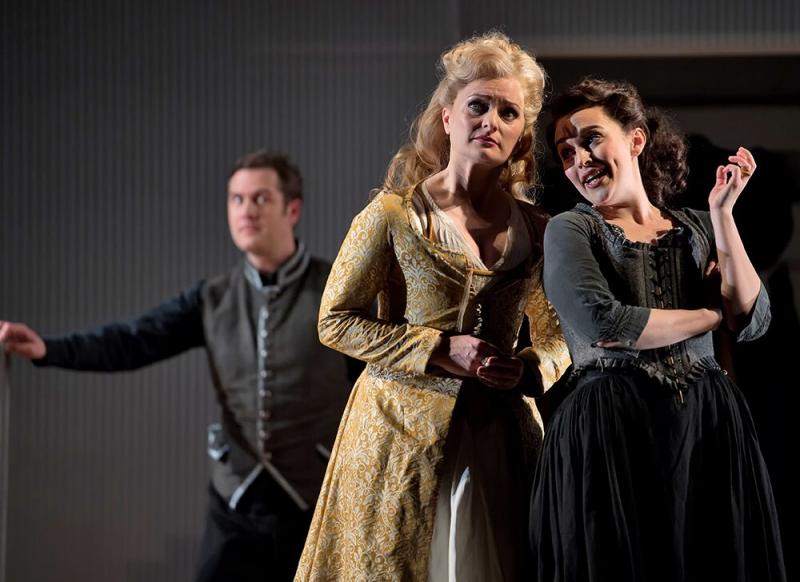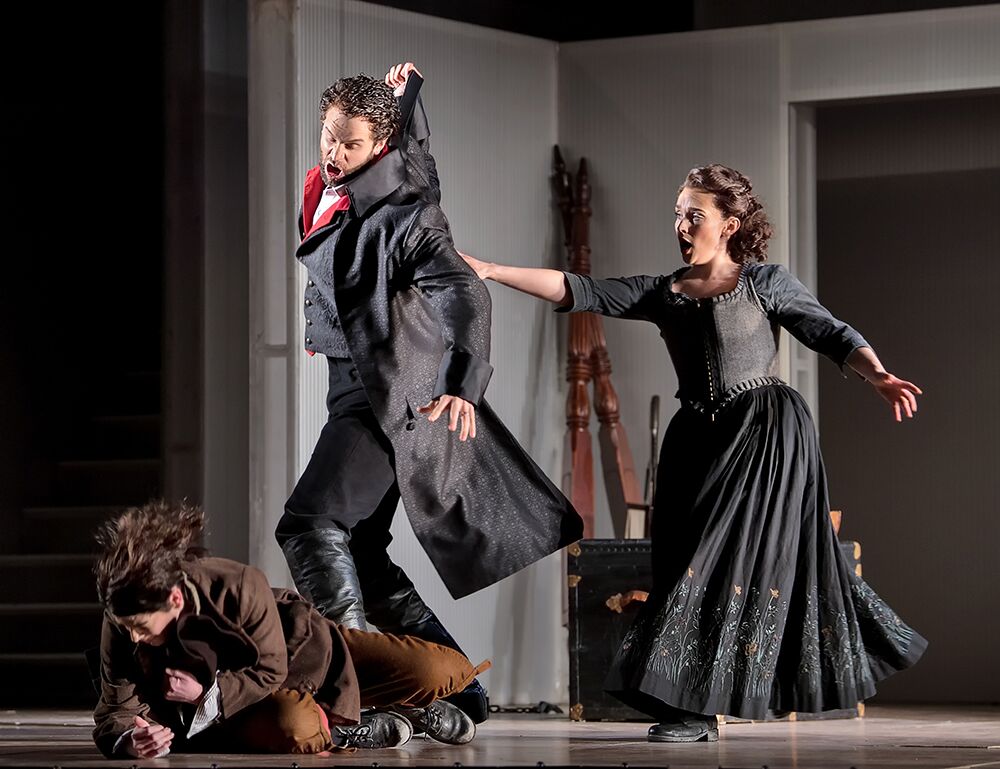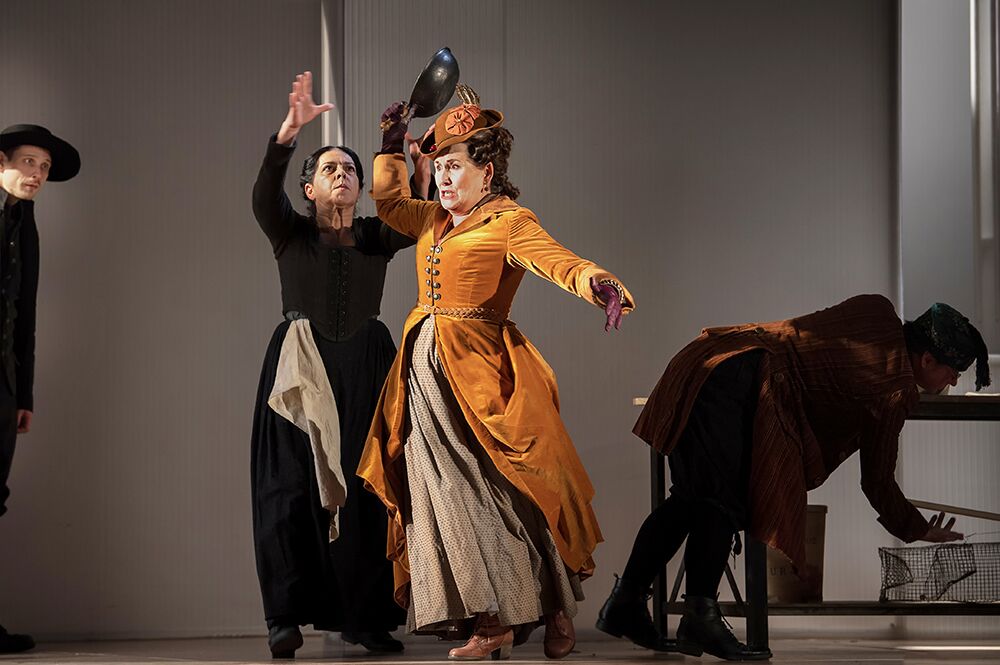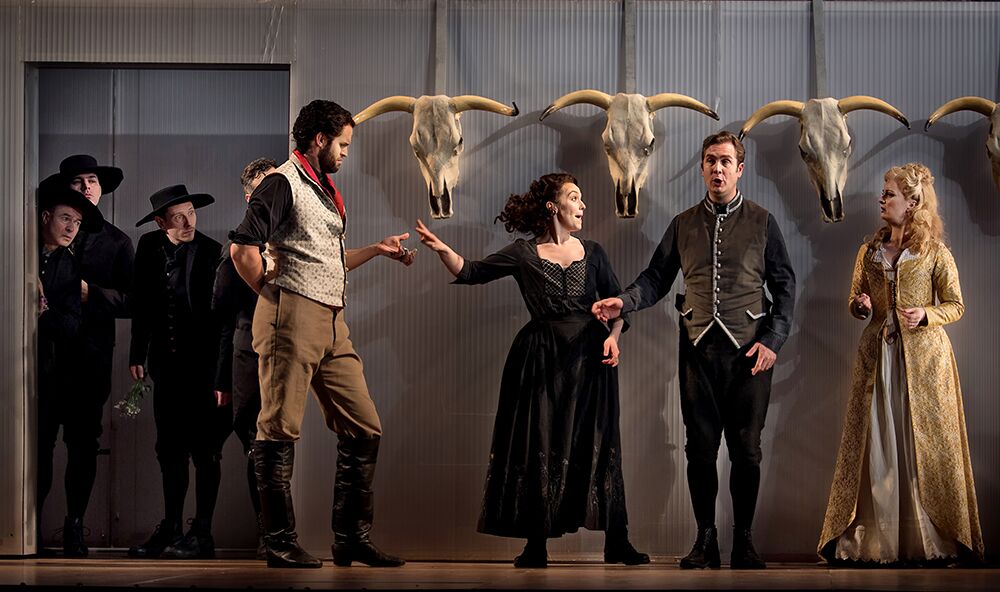The Marriage of Figaro, English National Opera review - sassy, probing and splendidly cast | reviews, news & interviews
The Marriage of Figaro, English National Opera review - sassy, probing and splendidly cast
The Marriage of Figaro, English National Opera review - sassy, probing and splendidly cast
Young British singers shine in this revival of Fiona Shaw's staging

One year to Brexit, a seemingly endless winter chill and Londoners need soul food, badly. I prescribe an evening of total immersion in The Marriage of Figaro.
It’s finely paced, varied, and sound of dramatic judgment, as well as full of detail – the character vignettes in the chorus are a treat. The palace’s many walls in Peter McKintosh’s set often whirl (we’ve got a revolve and we’re gonna use it!), yet never too much. It’s fresh and often laugh-out-loud funny, yet with a ferocious cruelty lurking just under the surface, as witnessed by the bullfight skulls, the weapons, the Count’s leather belt wielded against the unfortunate Cherubino. And Jeremy Sams’s translation bubbles and bounces. “You gaudy old parakeet!” – Susanna to Marcellina – is quite an improvement on “sibilla decrepita”.
Shaw excavates the work’s power structures with sharp eyes and merciless vision. The Count, big and slightly dim, is a brute under his seductiveness, though with a strong dose of Monty Python thrown in; the last scene reduces him almost to the Ministry of Silly Walks in his underpants. Susanna and the Countess run rings around him; even when Susanna mixes up her “yes” and “no” in their duet, she is not flustered, but enjoying a joke at his expense.  Yet there is real pain and danger in their world. And this is the one where the Countess gets away. So often, elsewhere, one wishes she would indeed pack her bags and walk away into the night, head held high. The problem is that the playwright Beaumarchais, librettist da Ponte and, above all, Mozart knew in that final scene of forgiveness that human nature is not that rational. That’s why the opera rings so desperately true. We wonder how far she will get before turning back.
Yet there is real pain and danger in their world. And this is the one where the Countess gets away. So often, elsewhere, one wishes she would indeed pack her bags and walk away into the night, head held high. The problem is that the playwright Beaumarchais, librettist da Ponte and, above all, Mozart knew in that final scene of forgiveness that human nature is not that rational. That’s why the opera rings so desperately true. We wonder how far she will get before turning back.
All eyes and ears for opening night were on the cast, many of whom are young singers in their role debuts. First of all, the ensemble works so beautifully that you have the feeling the performers are loving every moment of it. The cast of voices is well matched and beautifully balanced; perhaps a little more contrast of timbre would not have gone amiss, as Janis Kelly’s Marcellina is light-toned and Katie Coventry’s Cherubino not too dark either, but that is maybe splitting hairs. Most are British, which will please those who feel that nurturing British talent is part of ENO’s prime mission statement – and they do not disappoint.
Welsh soprano Rhian Lois, one of the current ENO Harewood Artists, in her role debut as Susanna, seems born for the part, her voice vivid with clear diction and a touching sweetness in her solo moments. Bass-baritone Ashley Riches (currently a BBC New Generation Artist) is an absolutely splendid Count, balancing the character’s strands – the seducer, the jealous husband, the vicious boss, the dolt – with some enjoyment and strong, beautiful tone that lives up to his name. Katie Coventry, also an ENO Harewood Artist, strikes just the right balance as Cherubino, beautifully musical and charming without being hammy (pictured above with Ashley Riches' Count poised to thrash and Rhian Lois's Susanna restraining him).  Janis Kelly’s Marcellina (pictured above) and Colin Judson’s Don Basilio are both clear-toned, wonderful of diction and excellent of timing; the characters are stripped of their Act IV arias, which in dramatic terms is a relief – but for once one would love them to have a chance to shine. Keel Watson is an imposing Dr Bartolo and tenor Paul Sheehan makes the most of the tipsy gardener Antonio, with whose lines Sams has had some fun (“The man I saw wasn’t riding – I think I’d have noticed the horse”). And there’s a splendid ENO debut for Alison Rose as a Barbarina as tipsy as her dad; a young award-winning soprano, having scooped both the Maggie Teyte Prize and the Leonard Ingrams Award, Rose is definitely one to watch. As Figaro himself, Dutch baritone Thomas Oliemans is lively, charismatic and suitably sparkly.
Janis Kelly’s Marcellina (pictured above) and Colin Judson’s Don Basilio are both clear-toned, wonderful of diction and excellent of timing; the characters are stripped of their Act IV arias, which in dramatic terms is a relief – but for once one would love them to have a chance to shine. Keel Watson is an imposing Dr Bartolo and tenor Paul Sheehan makes the most of the tipsy gardener Antonio, with whose lines Sams has had some fun (“The man I saw wasn’t riding – I think I’d have noticed the horse”). And there’s a splendid ENO debut for Alison Rose as a Barbarina as tipsy as her dad; a young award-winning soprano, having scooped both the Maggie Teyte Prize and the Leonard Ingrams Award, Rose is definitely one to watch. As Figaro himself, Dutch baritone Thomas Oliemans is lively, charismatic and suitably sparkly.
And our Countess is Lucy Crowe, the British soprano who so often seems to be everywhere, doing so many roles, that one might wonder if there are three of her. But she is developing and changing, and her tone proved distinctive, boasting a strong mix of creaminess, cut-through and a spot-on, pinging accuracy that’s always mellifluously phrased. Her first aria took a minute to settle, along with her characterisation, but thereafter she was simply outstanding.  On the podium, Martyn Brabbins leads a generous, airy, subtle and joyous account of this heavenly score – without any pretention, rushing, non-vibrato point-proving or excess ego to get in its way. A few glitches of coordination and timing between singers and orchestra will doubtless settle beyond first night. Special plaudits to Chris Hopkins for his suave and sensitive continuo, uncredited in the programme.
On the podium, Martyn Brabbins leads a generous, airy, subtle and joyous account of this heavenly score – without any pretention, rushing, non-vibrato point-proving or excess ego to get in its way. A few glitches of coordination and timing between singers and orchestra will doubtless settle beyond first night. Special plaudits to Chris Hopkins for his suave and sensitive continuo, uncredited in the programme.
Some critics, in the wake of the recent disastrous new La traviata on this stage, saw fit to call for the closing down of the company. This Figaro makes an equally strong case for the exact opposite.
rating
Explore topics
Share this article
Add comment
The future of Arts Journalism
You can stop theartsdesk.com closing!
We urgently need financing to survive. Our fundraising drive has thus far raised £49,000 but we need to reach £100,000 or we will be forced to close. Please contribute here: https://gofund.me/c3f6033d
And if you can forward this information to anyone who might assist, we’d be grateful.

Subscribe to theartsdesk.com
Thank you for continuing to read our work on theartsdesk.com. For unlimited access to every article in its entirety, including our archive of more than 15,000 pieces, we're asking for £5 per month or £40 per year. We feel it's a very good deal, and hope you do too.
To take a subscription now simply click here.
And if you're looking for that extra gift for a friend or family member, why not treat them to a theartsdesk.com gift subscription?
more Opera
 La bohème, Opera North review - still young at 32
Love and separation, ecstasy and heartbreak, in masterfully updated Puccini
La bohème, Opera North review - still young at 32
Love and separation, ecstasy and heartbreak, in masterfully updated Puccini
 Albert Herring, English National Opera review - a great comedy with depths fully realised
Britten’s delight was never made for the Coliseum, but it works on its first outing there
Albert Herring, English National Opera review - a great comedy with depths fully realised
Britten’s delight was never made for the Coliseum, but it works on its first outing there
 Carmen, English National Opera review - not quite dangerous
Hopes for Niamh O’Sullivan only partly fulfilled, though much good singing throughout
Carmen, English National Opera review - not quite dangerous
Hopes for Niamh O’Sullivan only partly fulfilled, though much good singing throughout
 Giustino, Linbury Theatre review - a stylish account of a slight opera
Gods, mortals and monsters do battle in Handel's charming drama
Giustino, Linbury Theatre review - a stylish account of a slight opera
Gods, mortals and monsters do battle in Handel's charming drama
 Susanna, Opera North review - hybrid staging of a Handel oratorio
Dance and signing complement outstanding singing in a story of virtue rewarded
Susanna, Opera North review - hybrid staging of a Handel oratorio
Dance and signing complement outstanding singing in a story of virtue rewarded
 Ariodante, Opéra Garnier, Paris review - a blast of Baroque beauty
A near-perfect night at the opera
Ariodante, Opéra Garnier, Paris review - a blast of Baroque beauty
A near-perfect night at the opera
 Cinderella/La Cenerentola, English National Opera review - the truth behind the tinsel
Appealing performances cut through hyperactive stagecraft
Cinderella/La Cenerentola, English National Opera review - the truth behind the tinsel
Appealing performances cut through hyperactive stagecraft
 Tosca, Royal Opera review - Ailyn Pérez steps in as the most vivid of divas
Jakub Hrůša’s multicoloured Puccini last night found a soprano to match
Tosca, Royal Opera review - Ailyn Pérez steps in as the most vivid of divas
Jakub Hrůša’s multicoloured Puccini last night found a soprano to match
 Tosca, Welsh National Opera review - a great company reduced to brilliance
The old warhorse made special by the basics
Tosca, Welsh National Opera review - a great company reduced to brilliance
The old warhorse made special by the basics
 BBC Proms: The Marriage of Figaro, Glyndebourne Festival review - merriment and menace
Strong Proms transfer for a robust and affecting show
BBC Proms: The Marriage of Figaro, Glyndebourne Festival review - merriment and menace
Strong Proms transfer for a robust and affecting show
 BBC Proms: Suor Angelica, LSO, Pappano review - earthly passion, heavenly grief
A Sister to remember blesses Puccini's convent tragedy
BBC Proms: Suor Angelica, LSO, Pappano review - earthly passion, heavenly grief
A Sister to remember blesses Puccini's convent tragedy
 Orpheus and Eurydice, Opera Queensland/SCO, Edinburgh International Festival 2025 review - dazzling, but distracting
Eye-popping acrobatics don’t always assist in Gluck’s quest for operatic truth
Orpheus and Eurydice, Opera Queensland/SCO, Edinburgh International Festival 2025 review - dazzling, but distracting
Eye-popping acrobatics don’t always assist in Gluck’s quest for operatic truth

Comments
Terrific to hear that ENO are